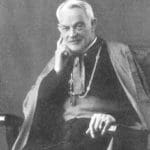THE TROUBLE OF MARY
“Who having heard was troubled at his saying, and thought with herself what manner of salutation this should be. And the Angel said to her, Fear not, Mary, for thou hast found grace with God. Behold thou shalt conceive in thy womb, and shalt bring forth a Son, and thou shalt call His name Jesus. He shall be great, and shall be called the Son of the Most High, and the Lord God shall give unto Him the throne of David his father, and He shall reign in the house of Jacob for ever, and of His kingdom there shall be no end.”
Luke 30-33
 1. It is not a little thing to discover that one so perfect as Our Lady could be troubled; therefore trouble of some kind is consistent with perfection such as hers. She was troubled “at his saying”; his saying, thus far, had been no more than the wonderful salutation; she was troubled because an Angel had used such wonderful words to her as: “Hail, full of grace, the Lord is with thee, blessed art thou among women;” and in her trouble she asked herself what these words would mean, and why they should be addressed to her. Soon, she was to understand; soon she was to glorify God at the thought that this salutation would ring through the world for all time; and it is a joy to me to know that when she hears it from my lips it is a cause of joy to her.
1. It is not a little thing to discover that one so perfect as Our Lady could be troubled; therefore trouble of some kind is consistent with perfection such as hers. She was troubled “at his saying”; his saying, thus far, had been no more than the wonderful salutation; she was troubled because an Angel had used such wonderful words to her as: “Hail, full of grace, the Lord is with thee, blessed art thou among women;” and in her trouble she asked herself what these words would mean, and why they should be addressed to her. Soon, she was to understand; soon she was to glorify God at the thought that this salutation would ring through the world for all time; and it is a joy to me to know that when she hears it from my lips it is a cause of joy to her.
2. The Angel calms her trouble with words that might well have caused fear and anxiety in one less steeped in faith, and hope, and love. She is not to fear, because she has found favour with God; He hath regarded the lowliness of His handmaiden. She is not to fear, because, virgin as she is, vowed to virginity as she is, she is to be a mother; how could this but be a further trouble? She is not to fear, because the Son she is to bring forth is to be the Messiah; what a weight of suffering this must mean! She is not to fear, because she is henceforth to be something quite different from that which she has hitherto been; her life is to be tossed and torn, and no longer left in its utter and happy solitude. How many a saint has quaked with fear at such a prospect!
3. Then she is given the first description of the Child which is to be hers. She has already long known Him in the prophets, the fruit of her lasting meditations. She has known Him in the depth of her heart, for God has been always very near to her. And now the Angel links on the new knowledge to the old, recalling the prophecies, focusing them upon this Child. First, He must be called Jesus, the Saviour. Then, He must be called the Son of the Most High. The first declares His manhood, the second his divinity. Then in Him the prophecies shall be fulfilled: the greatness of which the later prophets have spoken of in so many ways; beyond them the promised possession of the throne of David; back beyond that the fulfilment of the promise made to the house of Jacob; back beyond that again the complete restoration of the Kingdom which has suffered eclipse since the “days of Adam. Of His Kingdom there shall be no end;” we hear the words echoing later throughout the Apocalypse [Revelation] of St. John, the song that thunders in the infinite spaces, roll after roll through all eternity.
Summary Meditation Points:
1. Our Lady was troubled. She was troubled at being so saluted by the Angel.
2. Her trouble is calmed by the assurance of favour with God, but also of elevation to a dignity which will be no light burden.
3. She is told something of the nature of the Son, man, and God.

Editor’s Note: This meditation is from Archbishop Alban Goodier’s “The Prince of Peace” (1913).
Art: The Annunciation, Alessandro Allori, 1579, Restored Traditions, used with permission. Mirror of Archbishop Alban Goodier, S.J., www.stmaryscadoganstreet.co.uk, all rights reserved, used with permission.




